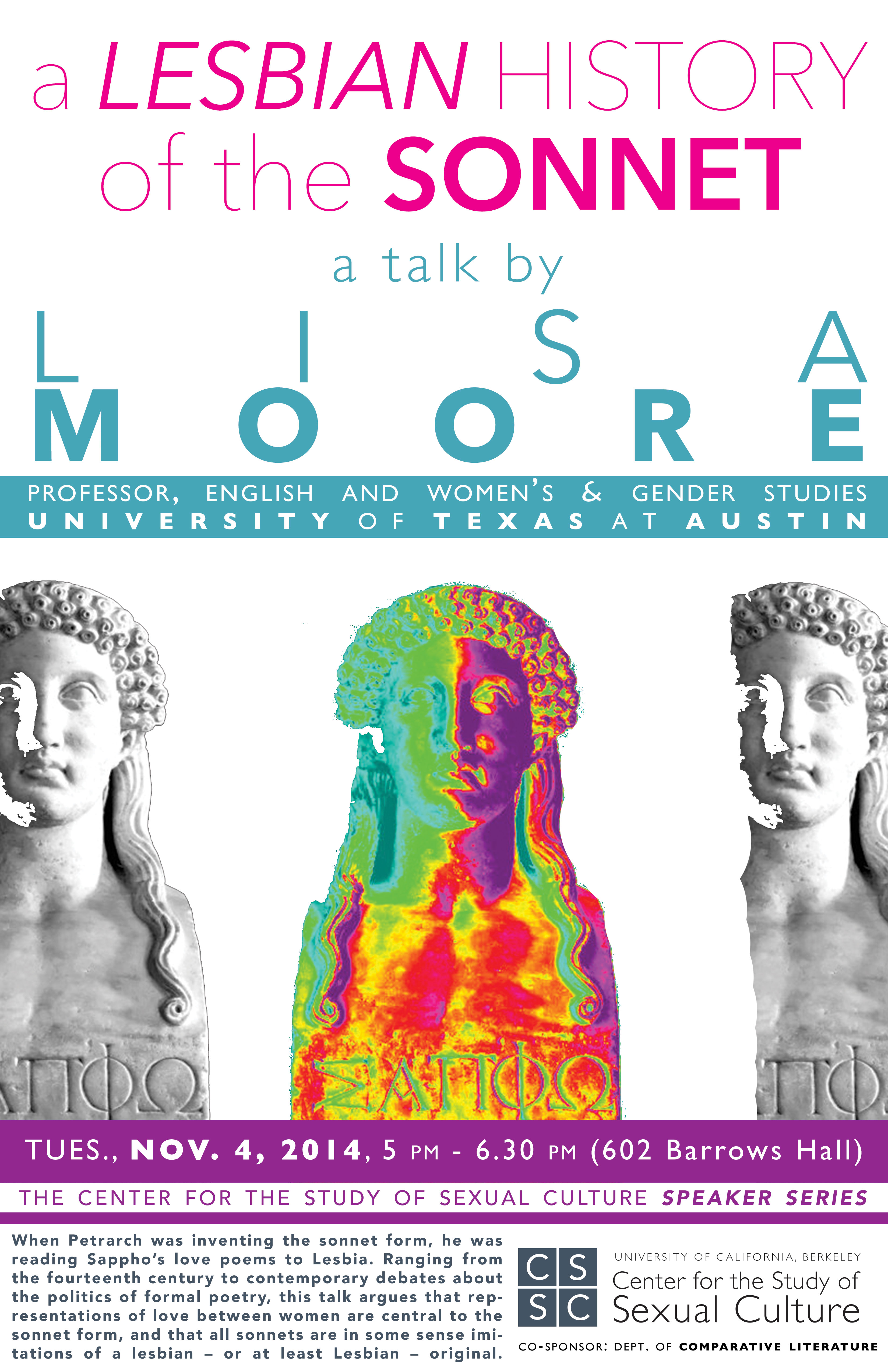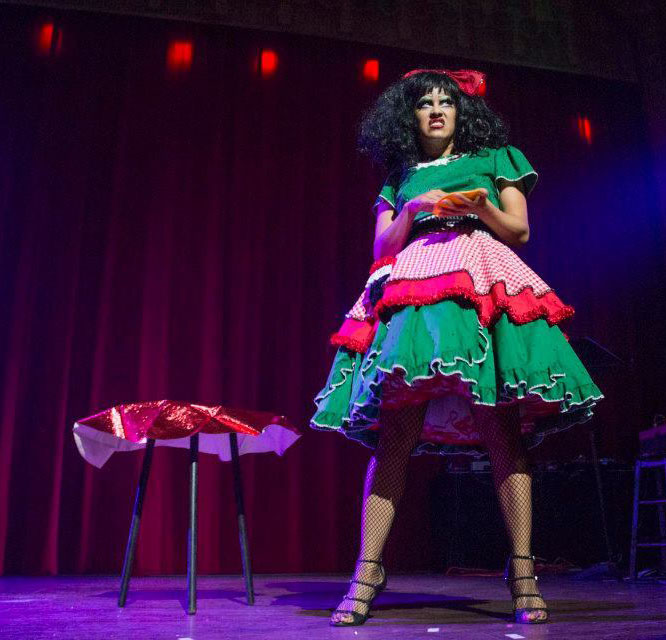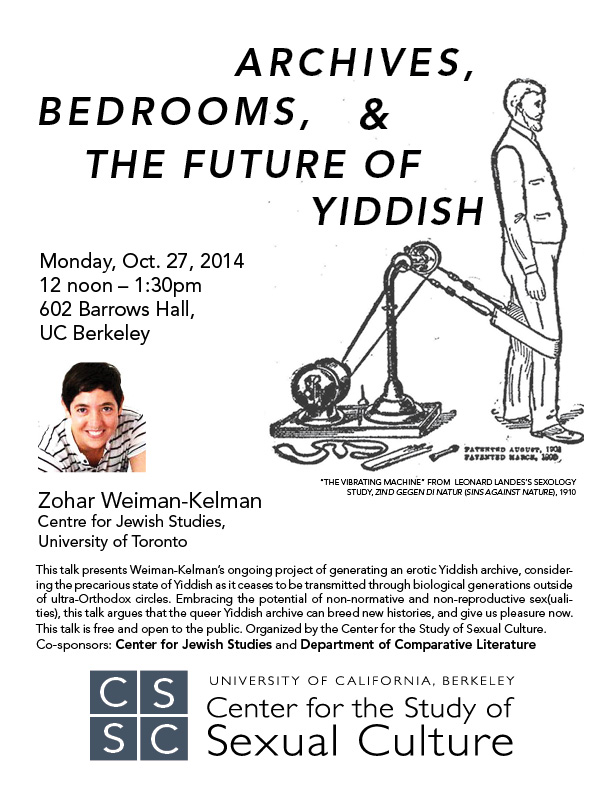2014
Feminist Translations/Queer Mobilities: A Symposium
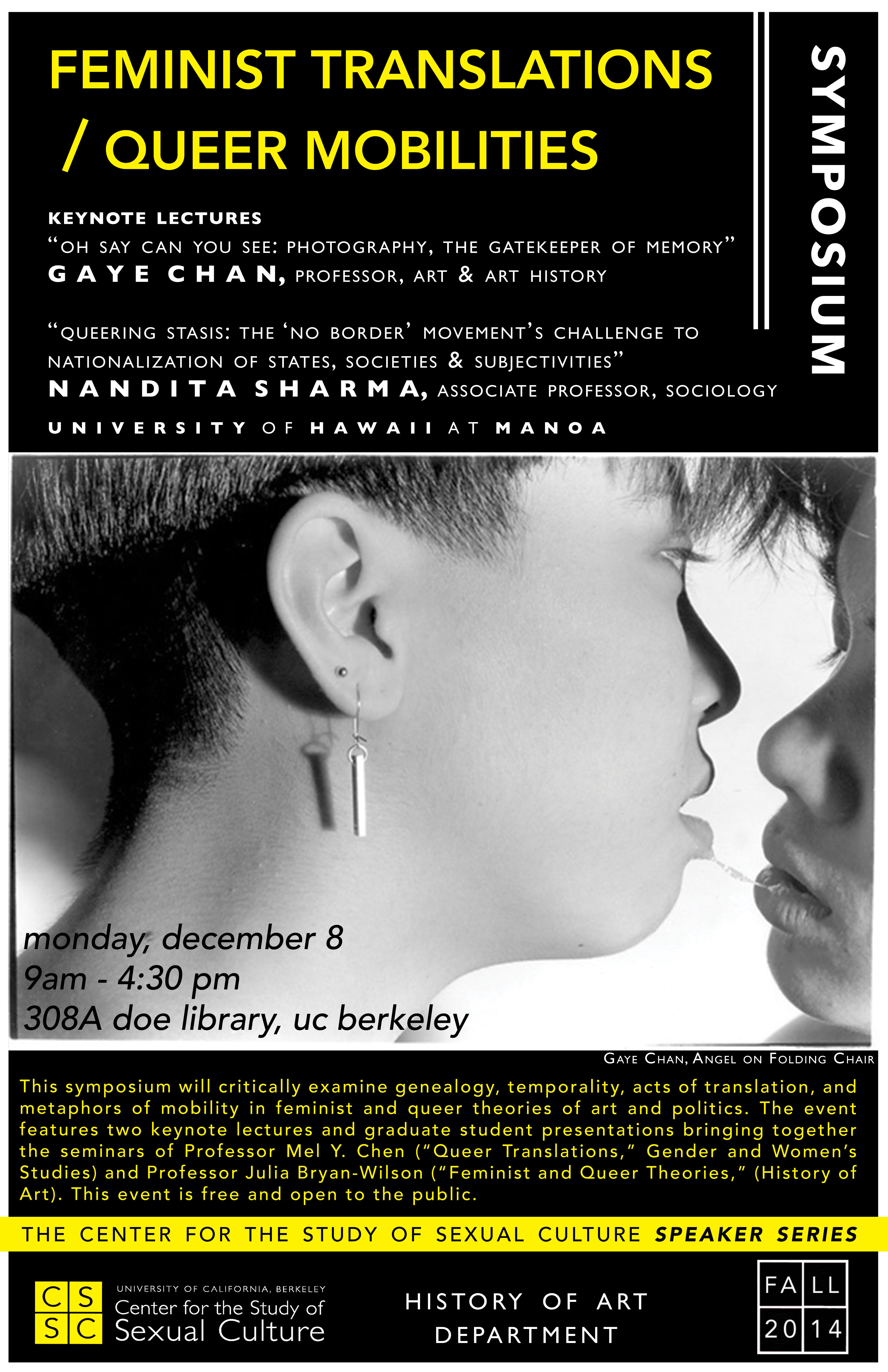 The UC Berkeley Center for the Study of Sexual Culture and the History of Art Department present the daylong symposium Feminist Translations/Queer Mobilities critically examines genealogy, temporality, acts of translation, and metaphors of mobility in feminist and queer theories of art and politics. It will attempt to give equal attention to artists and art objects as to theories, practices and methods, while presuming that the two domains are of course deeply intertwined.
Bringing together the graduate seminars of Professor Mel Y. Chen (“Queer Translations,” Gender and Women’s Studies) and Professor Julia Bryan-Wilson (“Feminist and Queer Theories,” History of Art) to foster trans-disciplinary conversation and debate, this event will feature graduate students presenting their final projects as well as keynote speakers Gaye Chan, Professor of Art & Art History, and Nandita Sharma, Associate Professor of Sociology; University of Hawaii at Mānoa.
Contact cssc@berkeley.edu with any questions. This event is free and open to the public.
SCHEDULE
9:00 INTRODUCTIONS, Julia Bryan-Wilson and Mel Y. Chen
9:15am, KEYNOTE LECTURE: “Queering Stasis: The ‘No Border’ Movement’s Challenge to the Nationalization of States, Societies and Subjectivities,” Nandita Sharma, Associate Professor of Sociology, University of Hawaii at Mānoa
10:20am, PANEL 1: RESIDUE
Brandon Callender, Queer Dreamworks: Privacy and the Black Gay Imagination
Jamal Batts, Black Don’t Crack: Social Death and Contemporary Black Postmortem Photography
Thadeus Dowad, Et in Sicilia ego: Wilhelm von Gloeden & the “Writing” of Queer History
Ace Lerner, Cruising Relationship: Considering Queer Affect
11:30am, PANEL 2: SPINNING
Gracen Brilmyer, Cripping the Digital Archive: Accessibility of Information
Lilith Dornhuber de Bellesiles, The Queer Art of Procrastination
Lyndsey Ogle, Inefficient Performance: Miranda July’s Somebody and the Site of Encounter
Daniel Valella, Spatializing “Intersectionality”: Rurality, Urbanity, and Hetero- and White Normativities in Craig Womack’s Drowning in Fire
2pm, PANEL 3: VELOCITY
Sarah Cowan, Heavy Bodies, Soft Things: Reciprocity in Senga Nengudi’s Early Sculptural Practice
Natalia Duong, Queering the Time of Consumption
Randi Evans, Performance and Queer Temporality: Reconstructing Them
Janell Tryon, The Fiction of Fixity: Maps in Transit
Olivia Young, All Facts Have Been Changed to Protect the Ignorant: The Illusion of Motion in the Work of Senam Okudzeto
3:30pm, KEYNOTE LECTURE: “Oh Say Can You See: Photography, the Gatekeeper of Memory,” Gaye Chan, Professor of Art & Art History, University of Hawaii at Mānoa
4:30pm, CONCLUSION
Keynote Lecture abstracts and speaker bios:
The UC Berkeley Center for the Study of Sexual Culture and the History of Art Department present the daylong symposium Feminist Translations/Queer Mobilities critically examines genealogy, temporality, acts of translation, and metaphors of mobility in feminist and queer theories of art and politics. It will attempt to give equal attention to artists and art objects as to theories, practices and methods, while presuming that the two domains are of course deeply intertwined.
Bringing together the graduate seminars of Professor Mel Y. Chen (“Queer Translations,” Gender and Women’s Studies) and Professor Julia Bryan-Wilson (“Feminist and Queer Theories,” History of Art) to foster trans-disciplinary conversation and debate, this event will feature graduate students presenting their final projects as well as keynote speakers Gaye Chan, Professor of Art & Art History, and Nandita Sharma, Associate Professor of Sociology; University of Hawaii at Mānoa.
Contact cssc@berkeley.edu with any questions. This event is free and open to the public.
SCHEDULE
9:00 INTRODUCTIONS, Julia Bryan-Wilson and Mel Y. Chen
9:15am, KEYNOTE LECTURE: “Queering Stasis: The ‘No Border’ Movement’s Challenge to the Nationalization of States, Societies and Subjectivities,” Nandita Sharma, Associate Professor of Sociology, University of Hawaii at Mānoa
10:20am, PANEL 1: RESIDUE
Brandon Callender, Queer Dreamworks: Privacy and the Black Gay Imagination
Jamal Batts, Black Don’t Crack: Social Death and Contemporary Black Postmortem Photography
Thadeus Dowad, Et in Sicilia ego: Wilhelm von Gloeden & the “Writing” of Queer History
Ace Lerner, Cruising Relationship: Considering Queer Affect
11:30am, PANEL 2: SPINNING
Gracen Brilmyer, Cripping the Digital Archive: Accessibility of Information
Lilith Dornhuber de Bellesiles, The Queer Art of Procrastination
Lyndsey Ogle, Inefficient Performance: Miranda July’s Somebody and the Site of Encounter
Daniel Valella, Spatializing “Intersectionality”: Rurality, Urbanity, and Hetero- and White Normativities in Craig Womack’s Drowning in Fire
2pm, PANEL 3: VELOCITY
Sarah Cowan, Heavy Bodies, Soft Things: Reciprocity in Senga Nengudi’s Early Sculptural Practice
Natalia Duong, Queering the Time of Consumption
Randi Evans, Performance and Queer Temporality: Reconstructing Them
Janell Tryon, The Fiction of Fixity: Maps in Transit
Olivia Young, All Facts Have Been Changed to Protect the Ignorant: The Illusion of Motion in the Work of Senam Okudzeto
3:30pm, KEYNOTE LECTURE: “Oh Say Can You See: Photography, the Gatekeeper of Memory,” Gaye Chan, Professor of Art & Art History, University of Hawaii at Mānoa
4:30pm, CONCLUSION
Keynote Lecture abstracts and speaker bios:
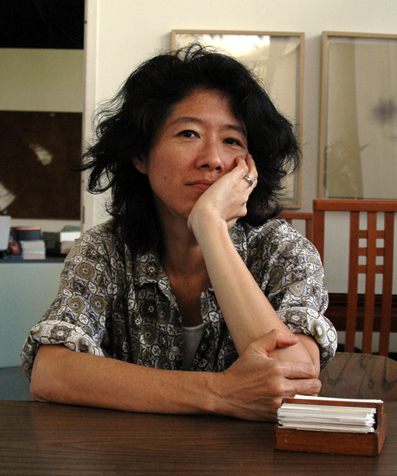 “Oh Say Can You See: Photography, the Gatekeeper of Memory”: Hawai’i-based artist Gaye Chan has created work across a spectrum of mediums and venues. In this presentation Chan will focus on her photo-based practice that examines how cartography and photography simultaneously offer and occlude information.
Gaye Chan is a Professor and the Chair of the Department of Art and Art History at the University of Hawai’i. She is a visual and media artist recognized equally for her individual and collaborative work. The latter includes being cofounder of Eating in Public at nomoola.com and DownWind Productions at downwindproductions.com. She was born in Hong Kong and immigrated to the United States in 1969. She received her MFA from San Francisco Art Institute. Her website is here.
“Oh Say Can You See: Photography, the Gatekeeper of Memory”: Hawai’i-based artist Gaye Chan has created work across a spectrum of mediums and venues. In this presentation Chan will focus on her photo-based practice that examines how cartography and photography simultaneously offer and occlude information.
Gaye Chan is a Professor and the Chair of the Department of Art and Art History at the University of Hawai’i. She is a visual and media artist recognized equally for her individual and collaborative work. The latter includes being cofounder of Eating in Public at nomoola.com and DownWind Productions at downwindproductions.com. She was born in Hong Kong and immigrated to the United States in 1969. She received her MFA from San Francisco Art Institute. Her website is here.
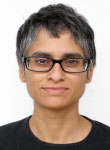 “Queering Stasis: The ‘No Border’ Movement’s Challenge to the Nationalization of States, Societies and Subjectivities”: The last thirty-odd years, precisely when scholarship on migration has flourished, is also the time in which a regime of global apartheid has been intensified. This apartheid is organized through a neo-liberal reorganization of state (im)migration policies whose aim is to increase the number of migrants but limit their mobility, rights and entitlements to the resources of societies that have been nationalized. Yet, despite dramatic increases in precarious forms of migration and the equally precarious situation of many migrants trying to sell their labor, significant political movements initiated by migrants — often those with the most precarious of statuses — have arisen. These, however, are not often discussed as part of the broader social movements (e.g. labour, feminist, anti-racist, etc.) of which, arguably, they are an important, even crucial, part. In my paper, I focus on the emergence of No Borders movements and discuss how they challenge both the material as well as affective organization of our relationships with one another both within and across nationalized spaces. I examine the historical context for the emergence of No Border politics, the relationship of No Borders movements to other ideas and movements and; how arguments for No Borders take up issues of labour organizing and processes of capitalist globalization. I conclude with a discussion of how the emergence of a politics of “No Borders” is an example of new theoretical and practical proposals for emancipatory thought and action that expand our imagination of the
political and of the human.
Nandita Sharma is Associate Professor of Sociology at the University of Hawai’i. Dr. Sharma is an activist scholar whose research is shaped by the social movements she is active in, including No Borders movements and those struggling for the commons. She is the author of Home Economics: Nationalism and the Making of ‘Migrant Workers’ in Canada (University of Toronto Press, 2006). She is also the co-editor (with Bridget Anderson and Cynthia Wright) of a Special Issue of the journal Refuge on “No Borders As a Practical Political Project” (26:2, released Fall 2011/dated Fall 2009). Her website is here.
“Queering Stasis: The ‘No Border’ Movement’s Challenge to the Nationalization of States, Societies and Subjectivities”: The last thirty-odd years, precisely when scholarship on migration has flourished, is also the time in which a regime of global apartheid has been intensified. This apartheid is organized through a neo-liberal reorganization of state (im)migration policies whose aim is to increase the number of migrants but limit their mobility, rights and entitlements to the resources of societies that have been nationalized. Yet, despite dramatic increases in precarious forms of migration and the equally precarious situation of many migrants trying to sell their labor, significant political movements initiated by migrants — often those with the most precarious of statuses — have arisen. These, however, are not often discussed as part of the broader social movements (e.g. labour, feminist, anti-racist, etc.) of which, arguably, they are an important, even crucial, part. In my paper, I focus on the emergence of No Borders movements and discuss how they challenge both the material as well as affective organization of our relationships with one another both within and across nationalized spaces. I examine the historical context for the emergence of No Border politics, the relationship of No Borders movements to other ideas and movements and; how arguments for No Borders take up issues of labour organizing and processes of capitalist globalization. I conclude with a discussion of how the emergence of a politics of “No Borders” is an example of new theoretical and practical proposals for emancipatory thought and action that expand our imagination of the
political and of the human.
Nandita Sharma is Associate Professor of Sociology at the University of Hawai’i. Dr. Sharma is an activist scholar whose research is shaped by the social movements she is active in, including No Borders movements and those struggling for the commons. She is the author of Home Economics: Nationalism and the Making of ‘Migrant Workers’ in Canada (University of Toronto Press, 2006). She is also the co-editor (with Bridget Anderson and Cynthia Wright) of a Special Issue of the journal Refuge on “No Borders As a Practical Political Project” (26:2, released Fall 2011/dated Fall 2009). Her website is here. Queer of Color Working Group: Regina Kunzel’s Criminal Intimacy
 The Queer of Color Working Group will be holding its final official meeting of the semester next Monday, November 24th. They will be discussing the introduction to Regina Kunzel’s Criminal Intimacy: Prison and the Uneven History of Modern American Sexuality, with Ch.1 available as optional reading. This working group is open to the public. To receive reading materials or join the bspace group, email Giancarlo Cornejo, cornejo@berkeley.edu or Brandon Callender, brandon.callender@berkeley.edu .
The Queer of Color Working Group will be holding its final official meeting of the semester next Monday, November 24th. They will be discussing the introduction to Regina Kunzel’s Criminal Intimacy: Prison and the Uneven History of Modern American Sexuality, with Ch.1 available as optional reading. This working group is open to the public. To receive reading materials or join the bspace group, email Giancarlo Cornejo, cornejo@berkeley.edu or Brandon Callender, brandon.callender@berkeley.edu .
A Lesbian History of the Sonnet
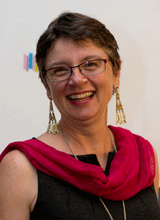 When Petrarch was inventing the sonnet form, he was reading Sappho’s love poems to Lesbia. Ranging from the fourteenth century to contemporary debates about the politics of formal poetry, this talk argues that representations of love between women are central to the sonnet form, and that all sonnets are in some sense imitations of a lesbian–or at least Lesbian–original.
When Petrarch was inventing the sonnet form, he was reading Sappho’s love poems to Lesbia. Ranging from the fourteenth century to contemporary debates about the politics of formal poetry, this talk argues that representations of love between women are central to the sonnet form, and that all sonnets are in some sense imitations of a lesbian–or at least Lesbian–original.
Lisa L. Moore, Professor of English and Women’s and Gender Studies at the University of Texas at Austin, is the author of Sister Arts: The Erotics of Lesbian Landscapes (Minnesota, 2011), which won the Lambda Literary Award and was a finalist for the Publishers’ Triangle Award. She also wrote Dangerous Intimacies: Toward a Sapphic History of the British Novel (Duke, 1997), and is the editor, with Omi Osun Jones and Sharon Bridgforth, of Experiments in a Jazz Aesthetic: Art, Activism, Academia, and the Austin Project (Texas, 2010) and, with Joanna Brooks and Caroline Wigginton, of Transatlantic Feminisms in the Age of Revolutions (Oxford, 2011), which was selected as a 2012 Choice Outstanding Academic Book of the Year. She has published articles and reviews in journals including GLQ, Eighteenth-Century Studies, Cultural Critique, Textual Practice, Signs, Albion, and Modern Philology. Her poems have been published by Split This Rock, Ostrich Review, Codex Journal, Broadsided, Sinister Wisdom, Lavender Review and others, and she won the 2012 Museum of Fine Arts-Houston Art/Lines Juried Poetry Competition. Professor Moore is a frequent contributor to the Poetry section at the Los Angeles Review of Books.
This event is free and open to the public. Sponsored by the UC Berkeley Center for the Study of Sexual Culture. Co-sponsored by the Department of Comparative Literature. For more information, please contact cssc@berkeley.edu
Sexual Futures, Queer Gestures, & Other Latina Longings
P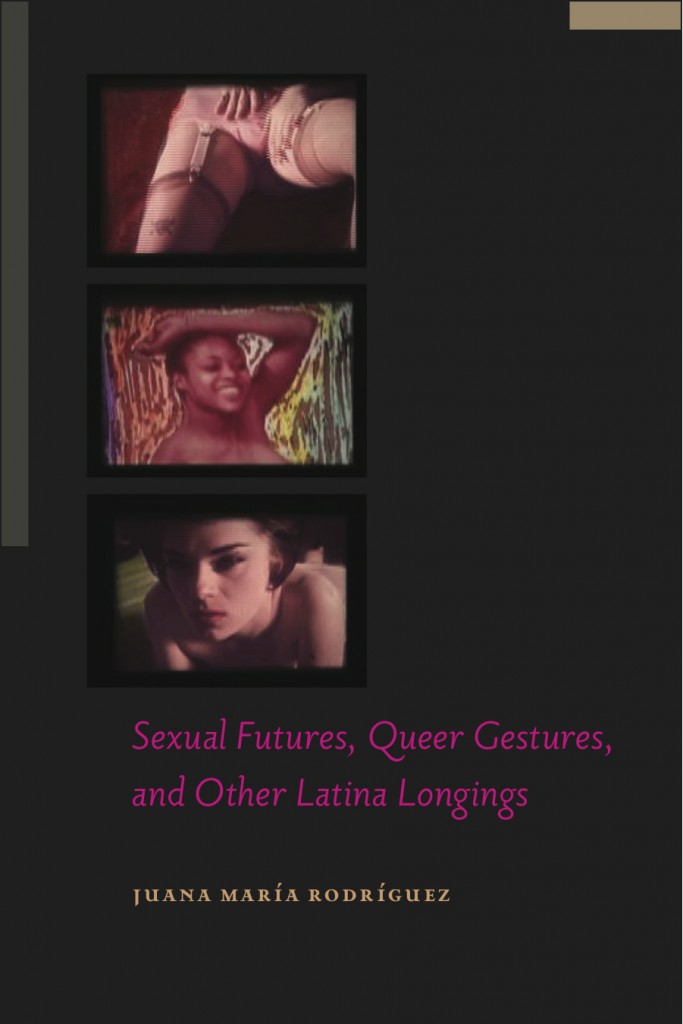 lease join the CSSC-sponsored Queer of Color Working Group for a conversation with Professor Juana María Rodríguez and Bay Area performance and video artist Xandra Ibarra/La Chica Boom on Sexual Futures, Queer Gestures, and Other Latina Longings, Professor Rodríguez’s new book (NYU Press, July 2014). Discussion will focus on Chapter 4, “Latina Sexual Fantasies, the Remix,” which features Ibarra’s work. For a pdf of the chapter and to join the Queer of Color Working Group mailing list, email Brandon Callender, <brandon.callender@berkeley.edu> or Giancarlo Cornejo, <cornejo@berkeley.edu>. This event is free and open to the public.
lease join the CSSC-sponsored Queer of Color Working Group for a conversation with Professor Juana María Rodríguez and Bay Area performance and video artist Xandra Ibarra/La Chica Boom on Sexual Futures, Queer Gestures, and Other Latina Longings, Professor Rodríguez’s new book (NYU Press, July 2014). Discussion will focus on Chapter 4, “Latina Sexual Fantasies, the Remix,” which features Ibarra’s work. For a pdf of the chapter and to join the Queer of Color Working Group mailing list, email Brandon Callender, <brandon.callender@berkeley.edu> or Giancarlo Cornejo, <cornejo@berkeley.edu>. This event is free and open to the public.
Juana María Rodríguez is Professor of Gender & Women’s Studies at UC Berkeley. Her research interests inclue sexuality studies, queer activism in a transnational American context, critical race theory, technology and media arts, and Latin@ and Caribbean studies. She is the author of Queer Latinidad: Identity Practices, Discursive Spaces (NYU Press, 2003). Her new book, Sexual Futures, Queer Gestures and Other Latina Longings (NYU Press, 2014), is described below. She is currently working on a third book project that considers the intersection of age, sexuality, race and visual culture.
Sexual Futures, Queer Gestures and Other Latina Longings proposes a theory of sexual politics that works in the interstices between radical queer desires and the urgency of transforming public policy, between utopian longings and everyday failures. Considering the ways in which bodily movement is assigned cultural meaning, Juana María Rodríguez takes the stereotypes of the hyperbolically gestural queer Latina femme body as a starting point from which to discuss how gestures and forms of embodiment inform sexual pleasures and practices in the social realm. For more on the book, click here.
Xandra Ibarra/La Chica Boom is an Oakland-based performance and video artist from the El Paso/Juarez border who performs and works under the alias of La Chica Boom. La Chica Boom is a performance art project that uses hyper-raciality/sexuality/gender as an expericne based mode of inquiry into my relationship coloniality, compulsory whiteness and Mexicanidad. Ibarra uses video, objects, photography and sex acts to evoke comedy and melancholic racial and sexual expectation. Her aim is to amplify gendered and racialized iconography and make such problematic constructions via spectacle more transparent to the spectator‚—what she calls spictacles—spectacles of degeneracy and power that are both against and engaged in the colonial gaze.
Archives, Bedrooms, and the Future of Yiddish
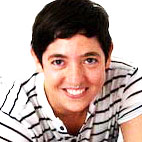 This talk will present Zohar Weiman-Kelman’s ongoing project of generating an erotic Yiddish archive. This archive, anchored in the potential of non-normative and non-reproductive sex(ualities), queerly celebrates Yiddish in the bedroom. Indeed, as Ann Cvetkovich writes, the bedroom is the space of the queer archive. Broadening the implications of identifying the archive with the bedroom, this talk will look at two archival projects that set out to collect sexual vocabulary in Yiddish, one from the early stages of the language and one from its later (and perhaps final) stages. It will then consider how the language of sexuality offers an alternative mode of accessing history and making space for it in the present. Finally, Weiman-Kelman will examine how the queer Yiddish archive reorients Derrida’s view of the archive as “a movement of the promise and of the future no less than recording the past,” by calling into question the coming of the future. She suggests that like queer sex, the queer Yiddish archive can breed new histories, and give us pleasure now.
This talk will present Zohar Weiman-Kelman’s ongoing project of generating an erotic Yiddish archive. This archive, anchored in the potential of non-normative and non-reproductive sex(ualities), queerly celebrates Yiddish in the bedroom. Indeed, as Ann Cvetkovich writes, the bedroom is the space of the queer archive. Broadening the implications of identifying the archive with the bedroom, this talk will look at two archival projects that set out to collect sexual vocabulary in Yiddish, one from the early stages of the language and one from its later (and perhaps final) stages. It will then consider how the language of sexuality offers an alternative mode of accessing history and making space for it in the present. Finally, Weiman-Kelman will examine how the queer Yiddish archive reorients Derrida’s view of the archive as “a movement of the promise and of the future no less than recording the past,” by calling into question the coming of the future. She suggests that like queer sex, the queer Yiddish archive can breed new histories, and give us pleasure now.
Zohar Weiman-Kelman holds the Anne Tanenbaum Postdoctoral Fellowship at the Centre for Jewish Studies at the University of Toronto. She was born and raised in West Jerusalem, where she received her B.A. in Hebrew and Yiddish literature. She completed her Ph.D. in Comparative Literature with a Designated Emphasis in Women, Gender, and Sexuality at UC Berkeley in 2012. Her research has led her to learn Yiddish, German and Polish, and she is deeply engaged in queer and feminist communities in Berlin, Warsaw and Israel/Palestine. Zohar is currently completing her first book manuscript, “What to Expect When You’re Not Expecting: Jewish Women’s Poetry 1880-1990.” This work brings together queer theory’s questioning of futurity with the challenge posed by Yiddish to reproductive heteronormative cultural transmission, to tell a new story of the Jewish past. She has also begun a new project, “Philology, Sexology, and the Future of Yiddish,” looking at the intersections of Yiddish language and sexuality.
This talk is free and open to the public. Organized by the Center for the Study of Sexual Culture. Co-sponsored by the Center for Jewish Studies and the Department of Comparative Literature.
Update Nov. 3: event audio recording now available here and also below! Please note, recording starts about 1 minute into the talk (apologies).
The Queerness and Games Conference
 The CSSC is co-sponsoring the second annual Queerness and Games Conference, a free, weekend-long, interdisciplinary event held Oct. 25-26, 2014 on the UC Berkeley campus. The goal of QGCon is to create an open and inclusive environment for discussing the intersection of video games and LGBTQ issues, however you define them. QGCon brings together academics and game developers to foster dialogues that break traditional disciplinary boundaries. The QGCon organizers believe in the importance of creativity and play as tools for intellectual and personal exploration.
The CSSC is co-sponsoring the second annual Queerness and Games Conference, a free, weekend-long, interdisciplinary event held Oct. 25-26, 2014 on the UC Berkeley campus. The goal of QGCon is to create an open and inclusive environment for discussing the intersection of video games and LGBTQ issues, however you define them. QGCon brings together academics and game developers to foster dialogues that break traditional disciplinary boundaries. The QGCon organizers believe in the importance of creativity and play as tools for intellectual and personal exploration.
Film Screening: Mommy is Coming, dir. Cheryl Dunye
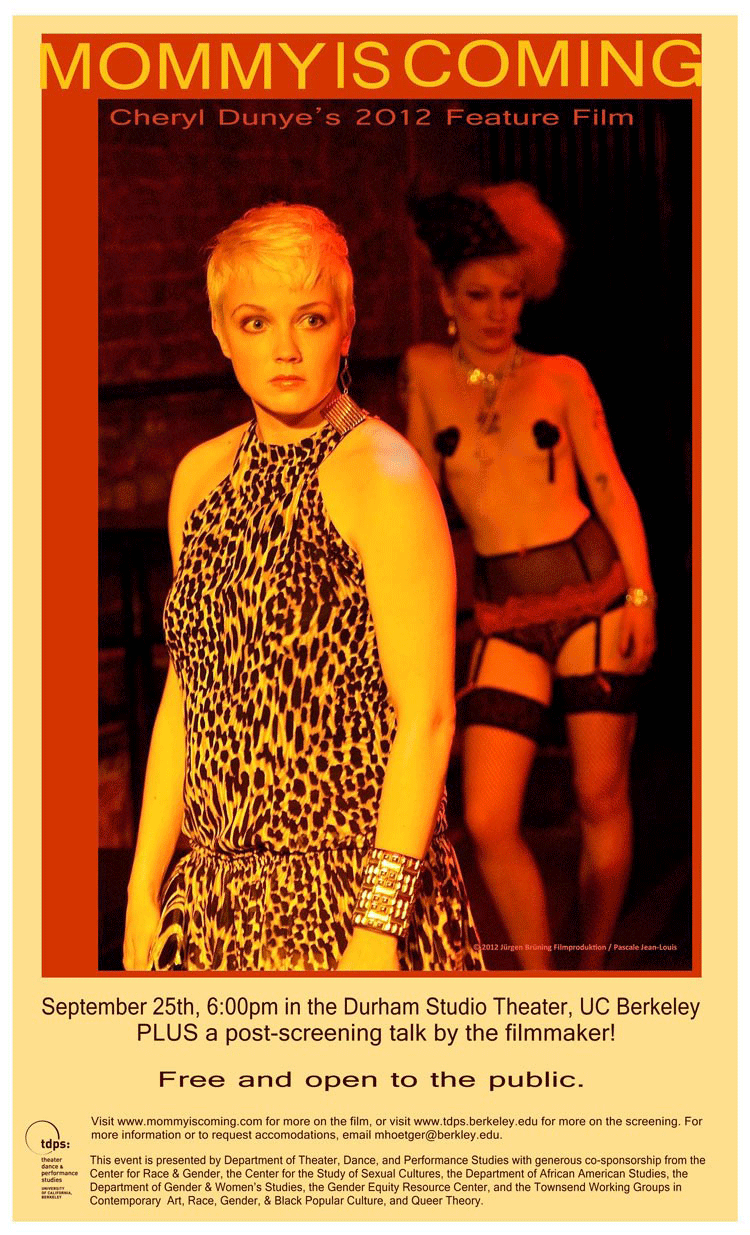 Mommy is Coming (US-Germany, 2012, 64 min.) is a recent feature-length film by internationally renowned filmmaker Cheryl Dunye. Part romantic sex comedy and part faux documentary, the film takes viewers on a sassy romp through the Berlin leather scene, imagining different possibilities for bringing sex and sexuality into public view. Dunye will be joining us for the screening and will speak afterwards about the film as well as her larger body of work.
Mommy is Coming (US-Germany, 2012, 64 min.) is a recent feature-length film by internationally renowned filmmaker Cheryl Dunye. Part romantic sex comedy and part faux documentary, the film takes viewers on a sassy romp through the Berlin leather scene, imagining different possibilities for bringing sex and sexuality into public view. Dunye will be joining us for the screening and will speak afterwards about the film as well as her larger body of work.
Free and open to the public.
Schedule
6:00pm — film screening
7:30pm — director’s talk + Q&A
8:30pm — reception
Durham Studio Theater, UC Berkeley. For more details on scheduling and disability accommodations, please visit the tdps.berkeley.edu or email mhoetger@berkeley.edu.
Queer of Color Working Group
 Please join the Queer of Color Working Group for the first meeting of the Fall 2014 semester. Sponsored by the Center for the Study of Sexual Culture, the QoC Working Group focuses on reading and sharing recent work in queer of color and transnational queer scholarship, and more broadly reading across the intersections of critical race and sexuality studies. This meeting will be a starting point to determine the schedule and discussion trajectory for the AY 2014-2015. The group’s current facilitators are Brandon Callender and Giancarlo Cornejo Salinas. To join the group mailing list or receive readings, email either facilitator at brandon.callender@berkeley.edu or cornejo@berkeley.edu. The QoC Working Group is open to the public.
Please join the Queer of Color Working Group for the first meeting of the Fall 2014 semester. Sponsored by the Center for the Study of Sexual Culture, the QoC Working Group focuses on reading and sharing recent work in queer of color and transnational queer scholarship, and more broadly reading across the intersections of critical race and sexuality studies. This meeting will be a starting point to determine the schedule and discussion trajectory for the AY 2014-2015. The group’s current facilitators are Brandon Callender and Giancarlo Cornejo Salinas. To join the group mailing list or receive readings, email either facilitator at brandon.callender@berkeley.edu or cornejo@berkeley.edu. The QoC Working Group is open to the public.
Queer Rhythms: The Makings of Race & Rehearsal
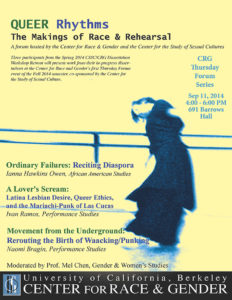 Three participants from the Spring 2014 CSSC/CRG Dissertation Workshop Retreat will present work from their in-progress dissertations at the Center for Race and Gender’s first Thursday Forum event of the Fall 2014 semester, co-sponsored by the Center for the Study of Sexual Culture. This event is free and open to the public. Location is wheelchair accessible. More info: http://crg.berkeley.edu/content/queer-rhythms
Three participants from the Spring 2014 CSSC/CRG Dissertation Workshop Retreat will present work from their in-progress dissertations at the Center for Race and Gender’s first Thursday Forum event of the Fall 2014 semester, co-sponsored by the Center for the Study of Sexual Culture. This event is free and open to the public. Location is wheelchair accessible. More info: http://crg.berkeley.edu/content/queer-rhythms
Moderated by Professor Mel Chen, Gender and Women’s Studies.
1. Ordinary Failures: Reciting Diaspora
Ianna Hawkins Owen, African American Studies
2. A Lover’s Scream: Latina Lesbian Desire, Queer Ethics, and the Mariachi-Punk of Las Cucas
Ivan Ramos, Performance Studies
3. Movement from the Underground: Rerouting the Birth of Waacking/Punking
Naomi Bragin, Performance Studies
TRANSGENDER STUDIES MATTERS
A one-day symposium presented by The Haas Institute for a Fair and Inclusive Society – LGBTQ Citizenship Cluster, Center for the Study of Sexual Culture, and Department of Gender & Women’s Studies.
What are the objects and inquiries of contemporary Transgender Studies? Explore the state of the field in this one-day symposium featuring a new generation of emerging transgender studies scholars speaking on such topics as experimental method, the place of surgery, environment, and citizenship. The talks will be paired with responses by UC faculty.
PANEL ONE – 10am to 12pm
Queer Lovers, Hateful Others, and Injured Trans People: Queer Regenerations of Race, Space and the Urban Environment
Jinthana K. Haritaworn, Environmental Studies, York University w/ Paola Bacchetta as respondent (Gender & Women’s Studies, UCB)
What kinds of queer regenerations are possible within the rapidly changing environment of the gentrifying inner city? What bodies and intimacies are vitalized through the globalizing moral panics over homo/transphobic Black and brown people, who form the constitutive outside of the newly queer-friendly community? Breaking with a western tradition of punishing, pathologizing and concealing queer intimacy, gay kisses have recently begun to come out in public. These coming outs occur in a fertile racialized terrain and are neither universal nor incidental: while some sexually and gender non-conforming bodies emerge as deserving of protection in the inner city, low-income racialized bodies are erasable regardless, albeit in gender and sexually specific ways. This lecture traces valuable and pathological queer and trans bodies through queer/friendly counter/publics in Berlin – a site of queer migration and capital investment whose geopolitical and biopolitical configurations are increasingly transnational. Besides as kissing, ‘queer’ bodies are also visibilized and valorized as injured. The spectacular vulnerability required to humanize the homonormative subject ironically enables transgender actors to enter a bigger stage for the first time. This lecture interrogates how the transnormative subject in Berlin has emerged as a victim subject worthy of protection and coalition in the co-presence of Queer Lovers and Hateful Others (Haritaworn 2015).
Trans- Surgery Matters
Eric Plemons, Anthropology, University of Michigan w/ Marcia Ochoa as respondent (Feminist Studies, UC Santa Cruz)
In the essay typically thought to mark the emergence of trans-studies, Sandy Stone advocated a refusal of the medical—and especially surgical—narratives that had long dominated discourses on trans-bodies and lives. This refusal has become somewhat of a political imperative: we don’t talk about surgery. While undoubtedly supporting one kind of social good—witness Laverne Cox’s much lauded recent appearance on The Katie Couric show—politically-oriented refusals to talk about trans- surgery contribute to a general lack of knowledge about what surgeons are doing in operating rooms across the US and around the world when they work to “change sex.” In this talk Plemons draws on his ethnographic work with trans- surgical specialists to argue for a robust and sustained engagement with surgery in trans- studies—not as an ideal or as a foil, but as a collection of ongoing and situated practices that literally give shape to the bodies that many trans- people desire and come to inhabit.
PANEL TWO 2pm – 4pm
Jorgensen’s Shadows
C. Riley Snorton, Communication Studies, Northwestern University w/ Juana Maria Rodriguez as respondent (Gender & Women’s Studies, UCB)
While numerous scholars have written about the implications of Christine Jorgensen’s rise to celebrity in the early 1950s, suggesting that Jorgensen’s visibility ignited a public discussion about science and sexuality in postwar America, Snorton turns to a series of media stories circulating primarily in the black press to provide a textured account of how blackness and transness are enacted upon in order to work through what it means to be(come) “American” in the mid-20th century. While this talk examines the appearance and disappearance of figures, such as Lucy Anderson Hicks, James McHarris, and Georgia Black from public conversations leading up to and in the wake of the atomic bomb, the Korean War, and the “red scare,” African American shake dancer Carlett Brown takes center stage. In 1953, Brown renounced her US citizenship in order to receive sexual reassignment surgery from Jorgensen’s Europe-based surgeon only to be detained by the state for owed taxes. By juxtaposing Jorgensen and Brown, this talk opens different lines of inquiry for examining postwar fascinations with transsexual bodies, figuring Brown at the center of questions of national identity, race, sexuality, gender, class and performance.
Reframing Agnes
Kristen Schilt, Sociology, University of Chicago and Chase Joynt, Visiting Artist, University of Chicago w/ Raka Ray as respondent (Sociology, UCB)
This paper results from a year-long collaboration between an artist and an academic. In 2013-2014, Joynt, a multi-media artist, and Schilt, a professor of sociology, have done a series of installations and screenings that focus on the authority of narrative construction and attempts at queer collaboration, with specific focus on transgender identities. At the center of this work is the 1967 case study of Agnes. Broadly understood as the first modern case study of a transgender person in sociology, the mythology and folklore surrounding Agnes – as both a person and an idea – has been taken up by social scientists, queer theorists, and trans scholars alike. Joynt and Schilt utilize this case to interrogate methods of public authority by placing Schilt’s sociological methods in conversation with Joynt’s artistic interventions. This hybridized and experimental paper is the first step in this endeavor. They draw on archival documents, analysis of case studies, and personal experiences and history.
Event sponsored by: The Haas Institute for a Fair and Inclusive Society – LGBTQ Citizenship Cluster, the Center for the Study of Sexual Culture, and the Department of Gender & Women’s Studies – Chau Hoi Shuen Program in Gender and Science
Co-sponsored by: The Center for Race and Gender, Berkeley Law
This event is free and open to the public.

